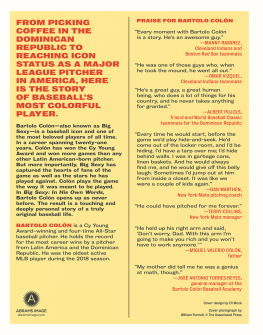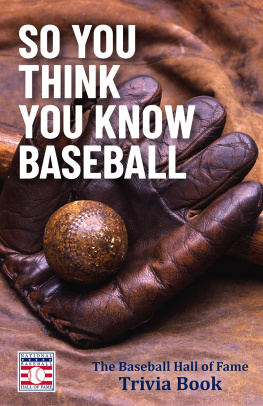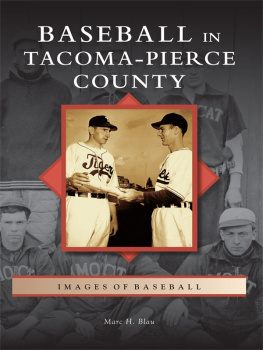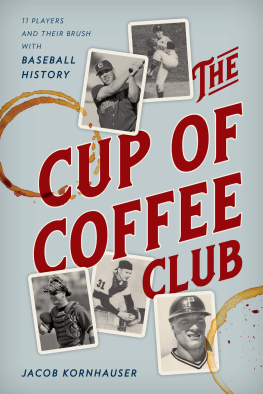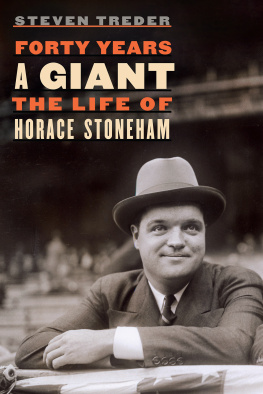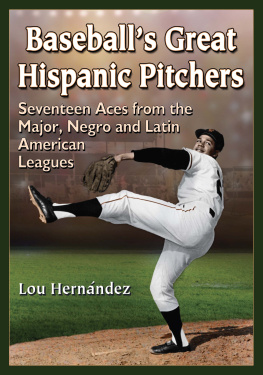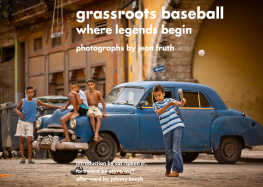Juan
Marichal
My Journey from the
Dominican Republic
to Cooperstown
Juan Marichal with Lew Freedman

To God, for giving me this talent,
for giving me the certainty that nothing is impossible.
To my mother, for showing me love and happiness.
To the love of my life, my soulmate, my rock, Alma Rosa,
for helping me fullfill my dream.
To my beloved children, grandchildren, and great-granddaughter.
All of you have brought so much joy to my life.
To my country. I am one proud Dominican Dandy.
To anyone and everyone I ever met through baseball,
you helped shape me into who I am.
Last but not least, to my fansthank you for the memories!
Contents
Introduction
by Lew Freedman
J ust before the ball flew out of his right hand hurtling toward home plate, Juan Marichals left foot kicked high in the air with the ease of a chorus-line dancer. That rare twist to his motion gave the pride of the Dominican Republic one of the most distinctive pitching styles in Major League Baseball history.
A batter trying to pick up the seams on the ball in order to read the pitch instead saw this foot right in his face (or so it seemed), and his concentration was broken. Most likely, the hitter swung and missed or made an out. Marichals kicking was so high, sometimes it seemed that it would throw him over backwards, yet somehow he managed to remain upright.
But more than just unique and disorienting, Marichal had pinpoint control and a range of effective pitches that set the future Hall of Famer apart from most hurlers. In a major league career spanning 1960 to 1975, Marichal was simply hard to beat. He was better than 95 percent of the pitchers in history. He was among the elite of the elite.
Born on October 20, 1937, in the Dominican Republic town of Laguna Verde, where his family farmed, Juan Marichal was a sensation as a teenager and a superstar as he matured. Although he briefly played with the Boston Red Sox and Los Angeles Dodgers, Marichal remains identified with his long-term team, the San Francisco Giants.
During his playing days, Marichal won 243 gamesthe most by a Latin American pitcher until Dennis Martinez surpassed him in 1998and compiled a lifetime 2.89 earned run average, among the finest marks of all time. Marichal was selected for the All-Star Game 10 times, was named Most Valuable Player of the midsummer classic in 1965, and pitched a no-hitter in 1963. Marichal pitched in one World Series, against the New York Yankees in 1962.
One of the greatest pitchers of his era, Marichal hooked up in memorable duels with the few other National League hurlers who were at his superstar level: Sandy Koufax, Warren Spahn, Don Drysdale, and Bob Gibson. It was Marichal, though, who with 191 victories won more games than any other pitcher in the 1960s. In June 1966, Time magazine spread out nine pictures of Marichal on its cover, accompanied by the phrase The Best Right Arm in Baseball.
Less known for the flat-out speed of his fastball, Marichal was more a master of control who baffled batters with a mix of speeds, pitches, and deliveries. They never knew where the ball was coming from or how it would arrive.
Although he was supervisor of the Oakland Athletics scouting operation for 14 years, Marichal remains most closely aligned with the Giants and such star teammates as Willie Mays, Willie McCovey, Monte Irvin, and Jim Davenport.
Growing up, Marichal did not live in luxury on the family property. Although they grew enough crops for everyone to have enough to eat, the home had neither running water nor electricity. Juans passion was always baseball, and he counted among his childhood friends the Alou brothersFelipe, Matty, and Jesusall future major leaguers. They became the first all-brother outfield while playing for the Giants, and Marichal remains as close as a fourth brother to them.
He also remains close to his old employer, the Giants. In 2010, following the teams surprising run to the National League pennant, Marichal was thrilled to be part of the festivities and to witness his old affiliations moment of glory as the club captured its first World Series title since 1954 (when the team was still located in New York). The Giants brought Marichal and the teams other living Hall of Famers to the Series home opener to throw out the ceremonial first pitch. It was a great thrill for the old pitcher to see the enthusiasm and ultimate triumph displayed by his underdog club.
Marichal is a national hero in the Dominican Republic. Friendly with several recent presidents of his native country, he is one of the most prominent and popular people on an island that is just a short plane hop from the United States and abuts Haiti along the countries mountainous border. A father of six, Marichal has been married to wife, Alma, since 1962.
Marichal emerged from Laguna Verde obscurity as a gangly teenager. He was inducted into the Air Force in Santo Domingo to play baseball and was ordered by dictator Rafael Trujillo and son Ramfis to play for their team in the capital rather than in his home area.
But Marichal was soon liberated from the Dominican national team by a Giants offer that took him to the minor leagues in 1958. In the United States, he gradually learned English and was treated courteously and kindly by families he boarded with in minor league towns. However, he also encountered discrimination because of his dark skin and his reliance on Spanish as his first language.
In the late 1950s, Latin American players were rare in organized baseball in the United States. But during the subsequent decade, players such as Marichal, Roberto Clemente, the Alou brothers, and others helped jump-start a revolution that has transformed the sport. They were pioneers, at the forefront of baseballs open-door policy to Latins that a half century later has resulted in an explosion of participation in the States (today, about one out of every four major league players are of Latin American origins), helped elevate the sport to greater heights of popularity throughout Latin America, and produced dozens of all-stars.
For Marichal, the journey culminated with election to the National Baseball Hall of Fame in 1983. He has long been a role model to young Hispanic players, and his name remains in front of Dominican and other Latin American fans through his work first as minister of sport in the Dominican Republic and as a Spanish-language broadcaster of postseason baseball for ESPN Deportes.
Marichals life has not been completely free of controversy. In the heat of an intense GiantsDodgers game in 1965, an argument with Los Angeles catcher Johnny Roseboro turned ugly and Marichal infamously swung his bat and hit Roseboro in the head. For such a normally long-fused man who never engaged in acts born of temper, it was a stunning mistake in judgment and forever tainted his otherwise perfect record of behavior on the diamond.
This brief moment of hot-headedness was an inexplicable departure from the norm in an exemplary life and has haunted Marichal for years. Most of the time, he was a gracious playing partner to both teammates and opposing players. Blessed with a sunny disposition, Marichal refers to men he has played with and known away from the field as gentlemen. It is just about the highest compliment he can offer. It is equally true that it could be turned around and applied to Marichal himself. That is how he strikes people, the impression he leaves, that he is always a gentleman.
Marichals major league career began dramatically. As a rookie in July 1960, he nearly pitched a no-hitter in his first game. He also engaged in one of the most famous pitching duels of the second half of the 20th century when he and fellow Hall of Famer Warren Spahn battled for 16 innings in a scoreless tie before Marichal won the game, 10.


